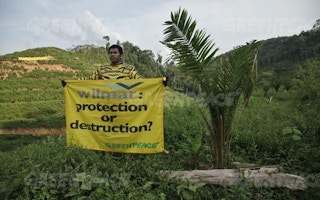In a surprising yet welcome end to a year that has seen several controversies in the palm oil sector, Singapore-listed agribusiness Wilmar International announced on Friday that its entire operations worldwide, including subsidiaries and third-party suppliers, will now commit to a ‘no deforestation, no peat, no exploitation’ policy.
This means the firm, which controls 45 per cent of the US$50 billion annual palm oil trade, is ensuring that the popular agricultural commodity found in numerous consumer products like chocolates, soaps and baked goods, will be produced sustainably – free from issues such as forest destruction, greenhouse gas emissions and human rights violations.
The nine-page integrated policy Wilmar issued contains an outline of actions concerning the three main points of no deforestation, no peat and no exploitation, such as:
- no development in high conservation value (HCV) areas,
- progressively reduce emissions on existing plantations,
- explore options for peat restoration,
- and to respect the rights of indigenous and local communities on their consent to operate on their lands.
They said “while plantation development has contributed significantly to economic development, deforestation and other unsustainable practices have many negative consequence for people and the environment”.
As such, they will be working in close partnership with growers, traders, processors, consumer goods companies, financial institutions and NGOs and other stakeholders relating to the palm oil supply chain to improve the industry.
Wilmar’s surprise announcement comes after months of intense campaigning for a no deforestation policy by Greenpeace International, a staunch advocate for palm oil sustainability and long critic of the firm. It welcomed the policy, saying it “has the potential to be a landmark win for the world’s forests and the people that depend on them for their livelihoods”.
“
Six months ago, fires from out-of-control deforestation in Indonesia choked Singapore and much of Southeast Asia – fires made possible by a no-questions-asked palm oil sector. This agreement could mark the start of a new ‘Green Revolution’ that provides the deforestation-free agricultural goods global consumers are increasingly demanding
Glenn Hurowitz, Climate Advisers managing director
This year alone, the environmental organisation has issued a number of allegations against Wilmar: naming them as one of the culprits behind the worst haze in Singapore and Malaysia early in June; calling the company responsible for the loss of tigers and their habitats in a 25-page report titled “A License to Kill”; and most recently – by association with Bumitama, a subsidiary – clearing peatland forests near the Tanjong Puting National Park in Indonesia, among others.
Both Greenpeace and Wilmar and other palm oil industry stakeholders were part of the recently concluded Responsible Business Forum on Sustainable Development in Singapore, where a high-level palm oil working group session was held and recommendations for the sector were drafted.
Bustar Maitar, head of the Indonesia forest campaign at Greenpeace International, who was also at the event, said: “Wilmar’s policy shows that the sector has a massive problem, and while this policy is great news for forests and tigers, its success will be judged by Wilmar’s actions to implement and enforce it.”
Meanwhile, non-profit The Forest Trust and policy consultancy Climate Advisers were less cautious with their welcome of the policy.
The two organisations, along with Unilever, helped Wilmar develop the corporate social responsibility commitment. The policy was a result of a decade worth of “aggressive and effective” advocacy for responsible palm oil production by global non-profit and non-government groups, said the two partners.
“Six months ago, fires from out-of-control deforestation in Indonesia choked Singapore and much of Southeast Asia – fires made possible by a no-questions-asked palm oil sector. This agreement could mark the start of a new ‘Green Revolution’ that provides the deforestation-free agricultural goods global consumers are increasingly demanding,” said Glenn Hurowitz, managing director of Climate Advisers.
“Today’s announcement by itself transforms the industry,” added TFT executive director Scott Poynton.
“It dwarfs in ambition any previous joint commitment in the sector and raises the bar for responsible global agricultural production. We commend Wilmar for their strong new policy, and now is the time for transparent and verifiable implementation.”
Unilever, for its part, recently embarked on a sustainable palm oil plan in November. They committed that 100 per cent of the palm oil used in their supply chain will be traceable to known sources by the end of 2014.
Wilmar International and Unilever are some of the latest additions to an increasing list of global companies becoming dedicated to zero deforestation, like Nestlé and Ferrero.
“The gauntlet is thrown to other palm oil traders such as Cargill, Musim Mas and Sime Darby to release similar policies,” said Maitar.
Currently, 85 per cent of palm oil is grown in Indonesia, Malaysia and Papua New Guinea, where some of the largest remaining rainforests in the world are, noted TFT and Climate Advisers.
However, in Indonesia, the palm oil sector is the biggest single cause of deforestation, said Greenpeace. And as such, the country is also the third largest source of emissions, next to China and the United States, the eco-group noted.

















